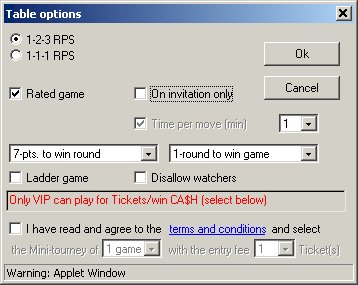|
|
Rock Paper Skill Game Rules
Introduction
GameColony Rock-Paper-Skill (RPS) game is based on one of the most popular games played around the world: Rock-Paper-Scissors also known as Rochambeau and in Japan as Janken. Rock Paper Scissors has many references in popular culture, e.g., The Seinfeld, The Simpsons, and That 70s Show all make fun of particular characters' incompetence at understanding the simple rules of the game. Read here how a Federal Judge ordered 2 lawyers to settle a dispute by playing a round of Rock, Paper, Scissors game.
Point Values for Default 1-2-3 Variation and Basic 1-1-1 Variation
Points, Rounds and Table Options
RPS and Skill As opposed to Rock, Paper, Scissors that kids play, RPS game significantly increases the element of skill in the game with the following: With the game extended over many sessions, the more skilled player will recognize and exploit the patterns of behavior of an opponent. The difference in point values awarded for wins by Rock, Paper and Scissors affects the risk/reward ratios that players need to keep in mind when using various patterns. Thus, different point values for Rock, Paper, Scissors further enhance the element of skill (as opposed to chance) in the RPS game, making it predominantly a game of skill. RPS Strategy RPS should not be compared to games of chance, such as bingo or lottery. RPS is first and foremost a mind game, a game of skill. Instead of making mindless or random choices like a beginner, a skilled RPS player makes a choice based on observation of patterns and on psychological factors (see below). This is most certainly not random. You will realize how non-random RPS is the very moment your opponent openly dares you (e.g, in online chat) to start with scissors... To predict what opening throw your opponent will lead with, you can consider two factors: (1) pattern (based on past performance) and (2) psychological factor. Pattern-based predictions deal with analysis of the past perfomance. For example, if over time you determined that your opponent is more likely to throw a Rock when trailing, perhaps a Paper can be tried. If your opponent consistently selects Paper as their preferred opener for his first run, then a cutting Scissors-lead will be more appropriate. You need, however, to vary your strategy when an evasive opponent starts masking their preferrences. That's when analysing a psychological factor should be helpful. Whether consciously or subconsciously, most RPS players throw in distinct patterns that can be figured out by perceptive observers. As a simplified example, one player may tend to choose a rock after a paper. Another player will rarely make the same choice twice in a row. Still another player will tend to repeat the same choice. A skillful opponent will note every choice their opponent makes and remember it for the future and eventually pick up the patterns. Once enough information is gathered, a stronger player will "get inside their opponent's mind". Some Patterns to Look for: If you can pick up opponent's preferential choice, you can "lock out" your opponent by rarely making a certain opposite choice. For example, if your opponent frequently selects scissors, it is a good strategy to minimize your choices of paper. Your success against this very opponent will increase dramatically. Play Rock-Paper-Skill Online |
||||||||||||||||||||||||||||||||||||||||
|
|
|||||||||||||||||||||||||||||||||||||||||
|
|
|||||||||||||||||||||||||||||||||||||||||




